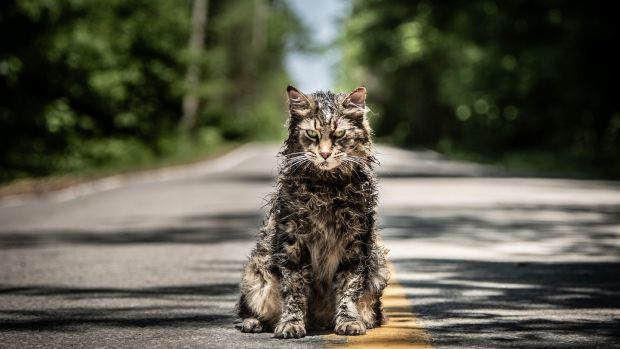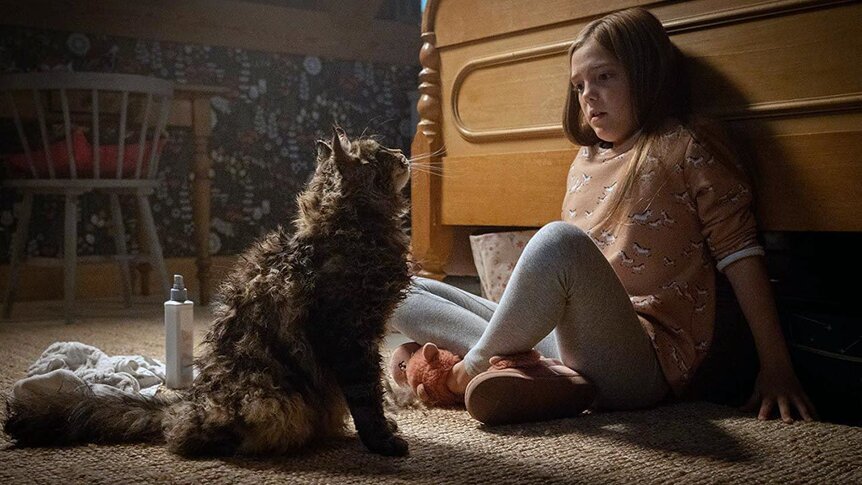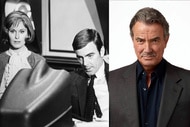Create a free profile to get unlimited access to exclusive videos, sweepstakes, and more!
Pet Sematary directors break down horror icon Christopher Young's haunting score

With their first two films, directors Kevin Kolsch and Dennis Widmyer have demonstrated a remarkable and unique gift not only for telling compelling stories but for creating distinctive and deeply evocative moods. Both Starry Eyes and Pet Sematary unsettle the viewer with a deft combination of conceptual complexity, character specificity, and sheer filmmaking bravado. But a less conspicuous gift they also possess is choosing the right collaborators to bring out and enhance their ideas, and in their remake of Pet Sematary, now available on Blu-ray, seasoned composer Christopher Young (Hellraiser) amplifies the intensity of an already deeply affecting story to make it more emotional than your typical horror film — and to make its treatise on grief a lot scarier than one might expect.
To commemorate the release of both Pet Sematary on home video and its invigorating score on vinyl courtesy the wonderful folks at Waxwork Records, SYFY WIRE spoke with Kolsch and Widmyer about their collaboration with Young, whose work includes more than 50 scores over four decades. In addition to talking about what drew them to Young and inspired their collaboration, the co-directors mused about their own appetites and interests when it comes to horror movie music and reflected on just a few of the moments where his work helped elevate and even transform what they were doing on-screen into something truly special.
Christopher Young is an iconic horror composer, but how did you decide he was the right guy to compose the score for Pet Sematary?
Widmyer: We wanted somebody who was still actively working and yet somebody who was a fixture in the horror community, because we knew that we wanted something traditional but also something kind of progressive. It was a way to have an update of the film that gave a nod to what it was, and at the same time doing something new — and that was how we approached the adaptation as a whole.
We wanted to make something that fans of the book and original film will see and enjoy, but also people who have never heard of the book or seen the original film will also get a thrill out of. So we really approached the score the same way. And so the thing that was exciting about Chris was that the guy's been doing this for so long; he's done scores from the best horror films, and he's still actively working. And we had heard that he just worked on another horror film for 20th Century Fox that has not been released yet and everybody was really happy — he was still coming up with new stuff and still had that passion, that fire. And so as a fan of his work, we were excited about the idea of getting to work with someone like him who could very easily do something like this, but was someone who was still hungry.
Kolsch: Working with Chris was great as well, because he had so much great input. When we first got him, we were like, "OK, give us that thing you do so well, like those classic scores," and it was actually Chris that wanted to shake things up and wanted to try doing things a little more electronic — to be fresh and now and not just doing what he'd done before. He didn't want to repeat himself. And together working with him, we came up with something that did what Dennis was saying, where it still feels like a classic horror score from Christopher Young where you feel like he was really challenging himself and bringing new things that he hasn't done before.
He's obviously created original scores, but he also has inherited others' work in the past. Were there any discussions about echoing any themes from the original film?
Widmyer: We were very aware of the original score, and Chris actually knew [composer] Elliot Goldenthal and was a fan of the score. We were happy to hear that, because we are also fans of the score. But the only inspiration really just came from that combination we said before -- doing something traditional and also doing something unique and new. And so there really weren't any actual nods to the specific score itself.
Kolsch: The way that Chris composes is he looks at every scene and he tries to get to the emotional core of that scene. He would say that he'd go home and lay in bed and wake up in the morning thinking of the film and hear something kind of echoing through his head or something. So I don't think that Chris really approaches his scores from such a conscious place; he just kind of like tries to tap into the emotion of the scene and lets the music come to him. So when Chris is writing a score, it's really all informed by the material.
What kinds of horror scores do you two typically respond to, as both movie lovers and filmmakers?
Widmyer: I am very inspired by scores. I like to write to scores, and every score just works for a particular movie. I like very operatic scores. I like very orchestral scores like Hellraiser. But then Christopher's score for The Grudge is a very frightening score, and I don't think it's overly orchestral. So he's one of those guys that you really can't put in a box, and that was what was so appealing to us. A lot of other composers [we] were looking at had their style and stuck to it, and that's great, but Chris was a chameleon in the way I like. So we knew that we wanted one unifying score for this, but we also wanted themes, and that's something I think has been kind of lost in a lot of scores in general. So a lot of what Chris did was finding those hooks to where if you closed your eyes you would feel like you were seeing the film.
That's sort of kind of gone out of style, especially with horror movies, where they've become very synth-driven and John Carpenter-inspired and overly soundscape-y, and we wanted something that was more traditional and thematic.
Kolsch: But John Carpenter and a lot of the synth scores I hear are big on themes. He had themes in his pieces. But what's important there is that score does so much in telling your story. It's what helps sell the illusion in watching a film; that's what helps create the tension and the fear. But also at the same time, a big part of a movie is a character arc and a story arc, so we don't approach scores just for isolated moments, like "This moment has to be scary" or "This moment has to be emotional." The score should also be serving the overall story and character arc, and that's done through themes, and themes that change throughout the story. And it really helps you know it really helps take people on that journey.
The score is such an important part of taking people through that full journey of the film.
Was there a specific scene that Chris particularly helped bring together? Or was there a key moment where he took what you did on set and amplified the impact of the storytelling to give it all of the dimensionality you wanted the film as a whole to have?
Widmyer: The easy answer is that the score obviously makes things scarier.
In a scene, you obviously do as much as you can in-camera, but you need the score to bring you across the finish line. So there were a lot of scenes where we needed him to dial it up.
But that said, one of the places where Chris was most vital was in bringing out the sorrow and the grief, and I think that's best exemplified by the scene where Ellie is hit by the truck. We knew that we wanted to drop the sound out in that scene and then have the score slowly bleed in almost like you weren't aware of it. That was one place where Chris didn't need to hem to a theme that he'd established in the film. He could almost do his own standalone piece, almost like a "grief" video. And the pictures had to convey the grief and the sadness, but the score did so much more because that sequence is bound together by four separate scenes to create one sequence of Ellie getting hit, the funeral, the parents coping with it, and then Rachel going back to Boston. And what Chris did so well was create one piece of music that connected all four of those into a very pivotal turning point in the movie.
Kolsch: Yeah, that was a tough scene. It was probably where we spent the most time with Chris as well, really just to get that right. Because want to tip over into melodrama, but you really do need the score to help with the emotional weight of that scene. So it was a really delicate balance. And in the end, he nailed it — it's one of the best pieces in the movie.















